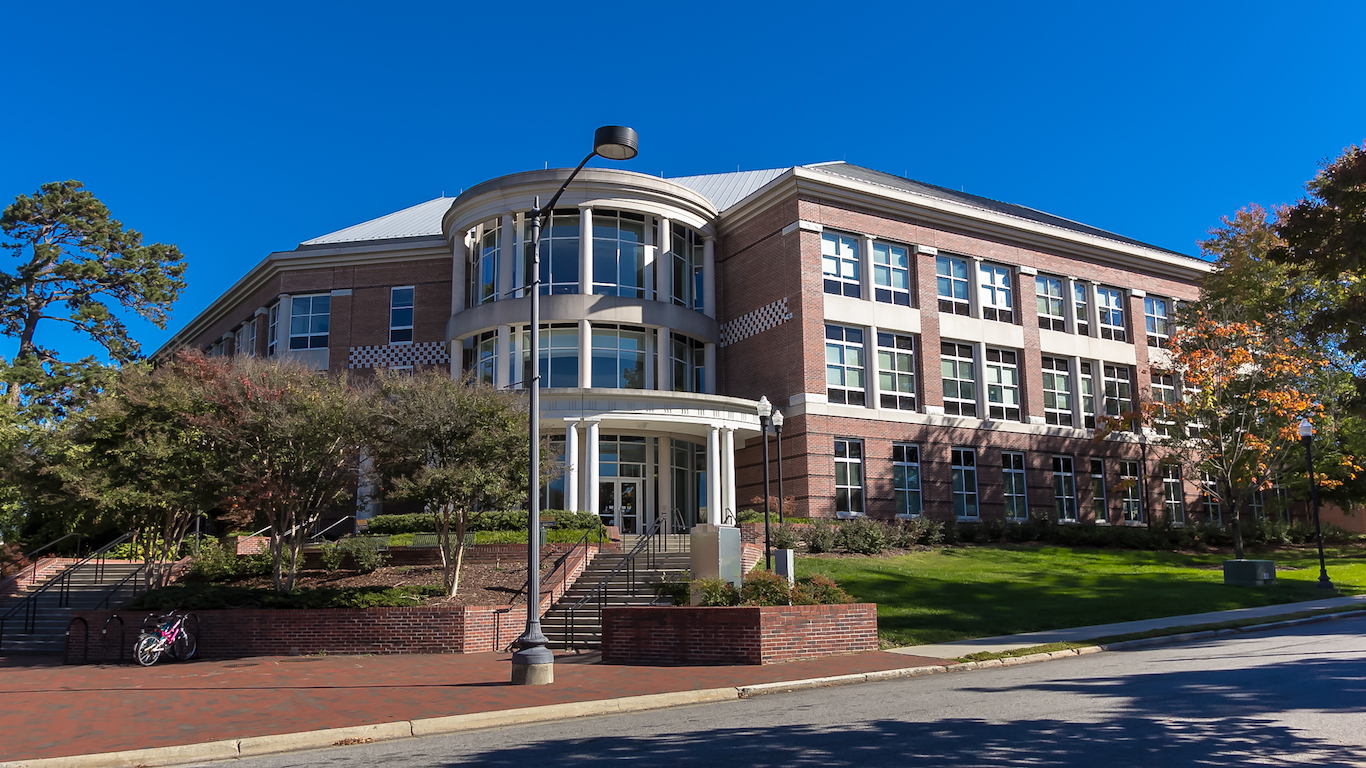

For those entering the workforce, a college education may be more important now than ever before. Labor Department data reveals that over 90% of new jobs are being filled by those with a four-year college degree. In keeping with this trend, while enrollment has recently trended downward, the number of Americans with a college degree has risen over the decades. As recently as the 1980s, fewer than one in five American adults had a bachelor’s degree. Today, more than one in three do.
[in-text-ad]
As the number of college educated Americans is at a record high, the job market is becoming increasingly competitive — and not all degrees are equally likely to translate into gainful employment. While the majority of college majors have unemployment rates of 3% or lower, there are others with jobless numbers closer to 9%.
Choosing a field of study in college is a personal decision often based on interests and talents. But for those who value employability after graduation above all else, some fields may be best avoided. 24/7 Wall St. reviewed data from the U.S. Census Bureau to identify the college majors with the highest unemployment rates.
It is important to note that while those who major in these fields are at an increased risk of joblessness, most of majors on this list still have a lower unemployment rate than the broader labor force as a whole, underscoring the importance of a college education, regardless of major.
Click here to see the college majors with the highest unemployment.
Click here to see the college majors with the lowest unemployment.
Click here to see our detailed findings and methodology.

25. Industrial and organizational psychology
> Unemployment: 4.2%
> Avg. salary: $62,738
> BA holders with a master’s degree: 58.7%
> BA holders in labor force: 24,812
[in-text-ad]

24. Mass media
> Unemployment: 4.3%
> Avg. salary: $49,223
> BA holders with a master’s degree: 20.3%
> BA holders in labor force: 280,041

23. Naval architecture and marine engineering
> Unemployment: 4.4%
> Avg. salary: $73,065
> BA holders with a master’s degree: 43.0%
> BA holders in labor force: 16,257

22. Intercultural and international studies
> Unemployment: 4.4%
> Avg. salary: $56,317
> BA holders with a master’s degree: 43.4%
> BA holders in labor force: 104,114
[in-text-ad-2]

21. Commercial art and graphic design
> Unemployment: 4.4%
> Avg. salary: $45,427
> BA holders with a master’s degree: 10.2%
> BA holders in labor force: 553,372

20. Cosmetology services and culinary arts
> Unemployment: 4.7%
> Avg. salary: $37,325
> BA holders with a master’s degree: 7.4%
> BA holders in labor force: 57,980
[in-text-ad]

19. International relations
> Unemployment: 4.7%
> Avg. salary: $73,287
> BA holders with a master’s degree: 68.4%
> BA holders in labor force: 142,424

18. Anthropology and archeology
> Unemployment: 4.7%
> Avg. salary: $47,660
> BA holders with a master’s degree: 49.5%
> BA holders in labor force: 239,473

17. Geological and geophysical engineering
> Unemployment: 4.8%
> Avg. salary: $73,815
> BA holders with a master’s degree: 51.6%
> BA holders in labor force: 9,347
[in-text-ad-2]

16. Botany
> Unemployment: 4.8%
> Avg. salary: $49,382
> BA holders with a master’s degree: 68.6%
> BA holders in labor force: 21,508

15. Humanities
> Unemployment: 4.8%
> Avg. salary: $44,614
> BA holders with a master’s degree: 44.7%
> BA holders in labor force: 49,067
[in-text-ad]

14. Clinical psychology
> Unemployment: 5.0%
> Avg. salary: $46,611
> BA holders with a master’s degree: 0.0%
> BA holders in labor force: 24,801

13. Composition and rhetoric
> Unemployment: 5.0%
> Avg. salary: $39,438
> BA holders with a master’s degree: 30.7%
> BA holders in labor force: 85,365

12. Metallurgical engineering
> Unemployment: 5.1%
> Avg. salary: $84,700
> BA holders with a master’s degree: 59.6%
> BA holders in labor force: 17,408
[in-text-ad-2]

11. Engineering and industrial management
> Unemployment: 5.1%
> Avg. salary: $59,714
> BA holders with a master’s degree: 36.6%
> BA holders in labor force: 39,585

10. Computer administration management and security
> Unemployment: 5.1%
> Avg. salary: $63,989
> BA holders with a master’s degree: 24.3%
> BA holders in labor force: 71,782
[in-text-ad]

9. Communication technologies
> Unemployment: 5.1%
> Avg. salary: $46,868
> BA holders with a master’s degree: 11.1%
> BA holders in labor force: 85,279

8. Drama and theater arts
> Unemployment: 5.3%
> Avg. salary: $45,469
> BA holders with a master’s degree: 27.7%
> BA holders in labor force: 236,240

7. Multi/interdisciplinary studies
> Unemployment: 5.6%
> Avg. salary: $44,376
> BA holders with a master’s degree: 30.3%
> BA holders in labor force: 70,990
[in-text-ad-2]

6. Film video and photographic arts
> Unemployment: 6.0%
> Avg. salary: $48,999
> BA holders with a master’s degree: 15.1%
> BA holders in labor force: 163,172

5. Mining and mineral engineering
> Unemployment: 6.2%
> Avg. salary: $82,897
> BA holders with a master’s degree: 57.1%
> BA holders in labor force: 13,541
[in-text-ad]

4. Educational psychology
> Unemployment: 6.5%
> Avg. salary: $37,766
> BA holders with a master’s degree: 0.0%
> BA holders in labor force: 24,730

3. Linguistics and comparative language and literature
> Unemployment: 6.7%
> Avg. salary: $41,777
> BA holders with a master’s degree: 61.0%
> BA holders in labor force: 102,650

2. Petroleum engineering
> Unemployment: 7.9%
> Avg. salary: $118,721
> BA holders with a master’s degree: 23.4%
> BA holders in labor force: 26,461
[in-text-ad-2]

1. Military technologies
> Unemployment: 8.9%
> Avg. salary: $59,954
> BA holders with a master’s degree: 67.1%
> BA holders in labor force: 5,616
Detailed Findings
As the share of Americans with a four-year degree has increased, so has student debt. Americans owe a staggering $1.4 trillion in outstanding student loans, more than any other form of household debt after home mortgages. By some estimates, 40% of Americans who entered college in 2004 and borrowed money for their will default on their loans by 2023.
As borrowing continues to climb, an increasing number of Americans are questioning the value of a college degree and whether the return is worth the investment — especially in some fields of study.
Many of the majors on this list are so specific that the number of job opportunities for those with the degree is relatively limited. Such fields include naval architecture and marine engineering, military technologies, and linguistics and comparative language.
Degrees in arts and psychology are also heavily represented on this list. Of the 25 majors on this list, nine fall into one of those two fields. Such majors include industrial and organizational psychology, drama, as well as film and photography.
In most cases, unemployment rates among the majors on this list are only high relative to most other college majors. Of the 160 college majors considered, just six have a higher unemployment rate than the 5.9% 2016 overall unemployment rate calculated by the Census.
Indeed, college-educated Americans are far less likely than those with less than a four-year degree to find themselves out of a job. According to the U.S. Census Bureau’s American Community Survey, 31.3% of American adults have a bachelor’s degree, but make up just 17.0% of the unemployed population.
For many college-educated Americans, a bachelor’s degree does not mark the end of their formal education. A considerable share of graduates in the majors on this list go on to earn professional degrees or doctorates. Master’s degrees are the most common educational pursuit after undergraduate programs, as some 41.5% of American bachelor’s degree holders also have a masters. Of the majors on this list, 12 have a higher than typical master’s degree attainment rate.
Methodology
To determine the college majors with the highest unemployment rates, 24/7 Wall St. reviewed data on employment status per undergraduate majors from the Public Use Microdata Sample summary files of the U.S. Census Bureau’s 2016 American Community Survey. In the case of ties, majors with the larger total workforce were ranked higher. Data on earnings and educational attainment also came from the Census. Data on field of study and employment status are self reported by the survey’s respondents. To be included in the dataset, the respondents must have graduated and received a bachelor’s degree. While respondents were able to list the field of study for any bachelor’s degree they have received and may have listed multiple majors, only the first major listed was considered in this analysis. Majors noted as a miscellaneous subset of a more common field of study were excluded from our analysis.
The U.S. Census Bureau’s unemployment rate is distinct from, and can vary considerably from, the more commonly cited unemployment rate from the Bureau of Labor Statistics.
Sponsored: Want to Retire Early? Here’s a Great First Step
Want retirement to come a few years earlier than you’d planned? Or are you ready to retire now, but want an extra set of eyes on your finances?
Now you can speak with up to 3 financial experts in your area for FREE. By simply clicking here you can begin to match with financial professionals who can help you build your plan to retire early. And the best part? The first conversation with them is free.
Click here to match with up to 3 financial pros who would be excited to help you make financial decisions.
Thank you for reading! Have some feedback for us?
Contact the 24/7 Wall St. editorial team.
 24/7 Wall St.
24/7 Wall St. 24/7 Wall St.
24/7 Wall St.
